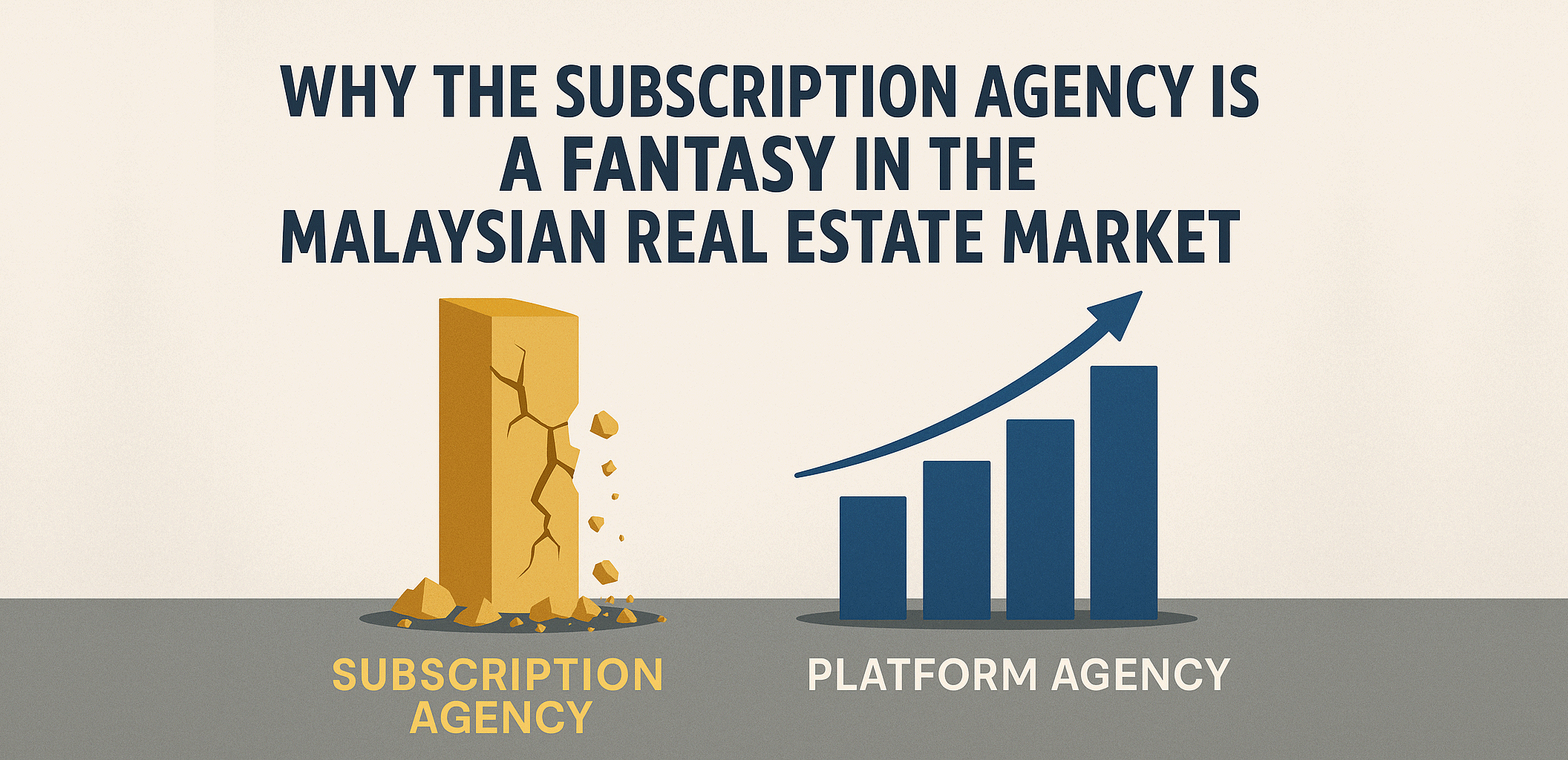Why the Subscription Agency Model is a Fantasy in the Malaysian Real Estate Market

Every few years, the concept of the "subscription agency"—where agents pay a flat monthly fee (a "desk fee" or "tech fee") to keep a very high percentage of their commission—re-emerges. It promises maximum independence and financial upside.
The metaphor for this failure is simple: The subscription model is like selling a gym membership to a freelance athlete. It’s theoretically good for their training, but it’s the first thing they cancel when they're "injured" (i.e., not closing deals).
In Malaysia, this model consistently collapses. This failure isn't due to a lack of ambition; it's due to a fundamental mismatch with the local market's income reality. Agents simply won't pay when their dry months hit.
1. The Flaw in the "Pay-to-Stay" Theory
The pitch is powerful: "Why give away 40% of your commission when you can pay a small, fixed fee and keep nearly every ringgit you close?"
The goal is to create stable, recurring revenue for the agency. However, the model operates on a principle that is rare in real estate: predictable agent income.
When deal flow slows down, reality bites. Agents who stop closing deals stop paying the fee. Since these subscriptions are essentially voluntary, the agency's foundational revenue—the fees—collapses almost overnight.
The Agent's Economics: Most negotiators operate deal-to-deal with little savings buffer. When listings go cold, they must cut costs. The first thing they eliminate is the non-essential, mandatory fee.
The Agency's Vulnerability: An agency built on a subscription fee is financially stable only when the agent is consistently closing. Since the industry is inherently volatile, the agency's revenue stream is unstable by design.
2. The Structural Barrier: Why Independence Can't Scale Here
While the majority of annual transaction volume is still in subsale (second-hand properties), the Malaysian market is a unique hybrid where new launches provide the major, large-ticket income opportunities that agents chase.
In markets built for independence, agents control their listings and run the entire sales process solo. That self-sufficiency makes a subscription viable.
In Malaysia, however, agents need access to both sectors, and success hinges on centralized support:
- Project Sales are Team Sports: New launches require vast, cooperative infrastructure: project authorization, quota management, centralized marketing approvals, sales gallery staffing, and complex documentation. You cannot secure or sell these projects as a lone, independent agent.
- Subsale Requires Central Support: Even in subsale, agents rely heavily on agency branding for credibility, large-scale co-broking networks, and centralized admin/legal teams to close complicated deals efficiently.
The subscription model was built for a market that rewards total independence. The high-earning Malaysian agent needs organized teamwork, so the solo model lacks the necessary functional leverage to sustain itself here.
3. The New Model: Payout on Performance, Not Payment to Stay
The key to fixing the agency model is simple: You must eliminate the "pay-to-stay" barrier and replace it with a "perform-to-earn" incentive.
The solution isn't the fixed-fee/100% split; it's the High-Split, KPI-Driven Model.
- Zero-Fee Entry: No mandatory fees to join or stay. This eliminates the cancellation trigger during dry months.
- Tiered Commission Split: A reasonable base split (e.g., 60/40) applies to all deals, which covers the agency's operational costs.
- KPI Bonus/Rebate: If an agent hits specific, measurable annual KPIs (e.g., total sales revenue or number of transactions), their split is retroactively rebated or adjusted to a much higher percentage (e.g., 80% or 90%).
This system tells the agent: "You don't pay to stay; you perform to get rewarded." It maintains a stable core workforce for the agency while offering top performers the near-100% reward they were seeking in the flawed subscription model.
4. What Agents Actually Pay For: Ecosystems Over Fragmentation
Malaysian agents are pragmatic: they don't pay for freedom; they pay for advantage. They are happy to share 20%–40% of their commission if it guarantees that advantage.
The current winning model is like being the manager and trainer for a pro sports team—you take a cut because you provide the structure, plays, and support that lead to wins.
The independent agent must handle everything alone (sourcing, marketing, legal, admin). This freedom without leverage is fragmentation—it's inefficient and exhausting. The modern agent understands that teamwork closes deals faster than independence ever could. This is why ecosystem-based agencies thrive while pure subscription models fail.
The Future: From Landlord to Platform
The subscription model failed because it assumed agents wanted freedom when they actually needed function and support.
The next era of sustainable agencies won't rely on desk fees. Instead, they will focus on becoming true Platforms that empower performance through:
- Verified Inventory Networks that create liquidity and give agents access to stock instantly.
- Intelligent Systems that automate compliance, documentation, and routine admin work.
- Data-Driven Insights that help agents prioritize their pipeline and target high-probability leads.
The successful agency of tomorrow won't charge agents for sitting there—it will provide the resources to enable them to perform and close. The dream of stability built on monthly agent fees ignored the industry's single constant: unpredictability.











































































































